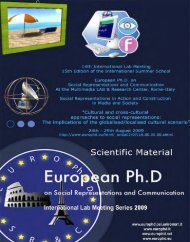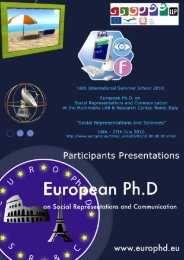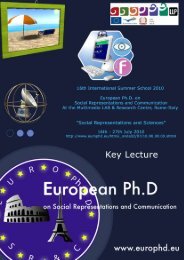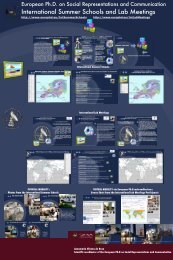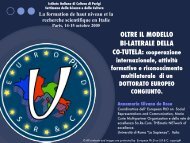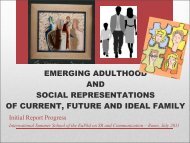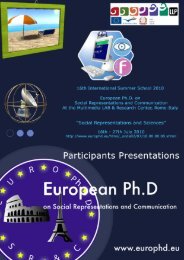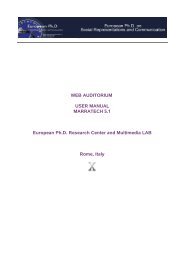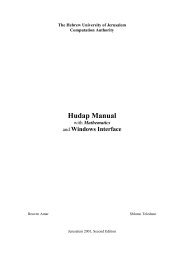The "boomerang" effect of the radicalism in discourse analysis
The "boomerang" effect of the radicalism in discourse analysis
The "boomerang" effect of the radicalism in discourse analysis
You also want an ePaper? Increase the reach of your titles
YUMPU automatically turns print PDFs into web optimized ePapers that Google loves.
<strong>The</strong> refusal <strong>of</strong> <strong>the</strong> communication concept is l<strong>in</strong>ked, consequently, to a voluntary<br />
omission, namely <strong>the</strong> exclusion <strong>of</strong> <strong>the</strong> <strong>in</strong>terpretation codes and <strong>of</strong> <strong>the</strong> attribution <strong>of</strong><br />
mean<strong>in</strong>g <strong>in</strong> orient<strong>in</strong>g and produc<strong>in</strong>g <strong>the</strong> <strong>discourse</strong>s and <strong>the</strong> social practices.<br />
Never<strong>the</strong>less, ano<strong>the</strong>r factor must be considered: not all <strong>the</strong> communication processes<br />
are observable.<br />
<strong>The</strong> metaphor <strong>of</strong> <strong>the</strong> communication is also refused because, although it is possible to<br />
agree with Middleton and Edwards (1990, p. 41-42) that <strong>the</strong> <strong>discourse</strong> <strong>analysis</strong> may not<br />
have a solely descriptive purpose, <strong>the</strong> focus<strong>in</strong>g <strong>of</strong> this approach concerns exclusively<br />
that which is observable. As Middleton and Edwards affirm (1990), <strong>in</strong> <strong>the</strong>ir study <strong>of</strong> <strong>the</strong><br />
relationship between <strong>discourse</strong> and remember<strong>in</strong>g: "like <strong>the</strong> behaviourist, our <strong>analysis</strong><br />
rema<strong>in</strong>s at all times close to <strong>the</strong> observable, recorded conversational record.” (p. 43). It<br />
is accord<strong>in</strong>gly evident that <strong>the</strong> not directly observable aspects (but ones constitutive <strong>of</strong><br />
<strong>the</strong> communication) are conceived as an emerg<strong>in</strong>g feature <strong>of</strong> a discursive practice, and<br />
not as an "external" item <strong>of</strong> <strong>the</strong> <strong>discourse</strong> itself. In this view everyth<strong>in</strong>g is <strong>in</strong>side <strong>the</strong><br />
<strong>discourse</strong>: <strong>the</strong> cognitive phenomena (<strong>the</strong> memory, <strong>the</strong> purposes, <strong>the</strong> representations) are<br />
"objects" <strong>of</strong> (or with<strong>in</strong>) <strong>the</strong> <strong>discourse</strong> (Potter and Edwards, 1999).<br />
“Analysis has concentrated not on <strong>the</strong> sense-mak<strong>in</strong>g role <strong>of</strong> representations (although this is not<br />
excluded <strong>in</strong> pr<strong>in</strong>ciple), but on <strong>the</strong> way <strong>the</strong> representations are constructed as solid and factual, and on <strong>the</strong>ir<br />
use <strong>in</strong>, and orientation to, actions (assign<strong>in</strong>g blame, elicit<strong>in</strong>g <strong>in</strong>vitations, etc.). Representations are treated<br />
as produced, performed and constructed <strong>in</strong> precisely <strong>the</strong> way that <strong>the</strong>y are for <strong>the</strong>ir role <strong>in</strong> activities.”<br />
(Potter & Edwards, 1999, p. 448)<br />
Although <strong>in</strong>terest<strong>in</strong>g, <strong>the</strong> fact <strong>of</strong> consider<strong>in</strong>g <strong>the</strong> processes and <strong>the</strong> objects <strong>of</strong><br />
representation as immanent to a discursive practice may lead to several criticisms. <strong>The</strong><br />
RDA is characterised by a "monologism" <strong>in</strong> which every traditional concept <strong>of</strong> social<br />
psychology is brought back to <strong>discourse</strong> and to its pragmatic function. If taken to its<br />
extreme limits, this epistemological vision risks generat<strong>in</strong>g a tautology <strong>in</strong> which every<br />
concept, be<strong>in</strong>g a discursive practice or one <strong>of</strong> its characteristics, is equal to very o<strong>the</strong>r<br />
concept. Here are some examples.<br />
29




